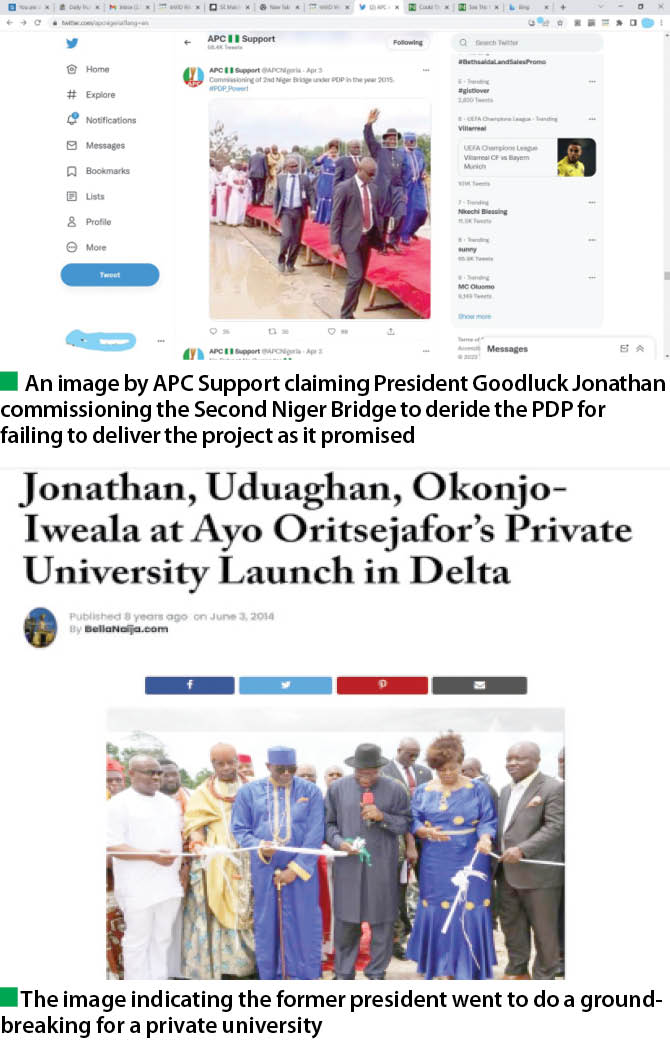Image of Jonathan on red carpet stage not related to Second Niger Bridge
Claim: An image of a former president of Nigeria, Goodluck Jonathan, was posted on a Twitter account named APC Support, with a caption stating how the Second Niger Bridge looked like when it was commissioned under the Peoples Democratic Party (PDP) in 2015. Verdict: The claim is false. The image was taken when the former […]

Claim: An image of a former president of Nigeria, Goodluck Jonathan, was posted on a Twitter account named APC Support, with a caption stating how the Second Niger Bridge looked like when it was commissioned under the Peoples Democratic Party (PDP) in 2015.
Verdict: The claim is false. The image was taken when the former president launched a private university owned by then president of the Christian Association of Nigeria, Ayo Oritsejafor.
- ‘Tinubu remains APC’s best presidential candidate’
- Train ticket racketeering is how corruption kills
Full text
An image of a former president of Nigeria, Goodluck Jonathan, was posted on Twitter by an APC Support with a caption, “Commissioning of second Niger bridge under PDP in 2015. #PDP_Power!”
The image, which had the former president walking on a platform clad with red carpet was posted to deride Nigeria’s main opposition party for failing to construct the second Niger bridge it promised since it came to power in 1999.
Brief on the Second Niger Bridge
The second Niger bridge was proposed as an alternative route for travellers going to the South East from the South West and vice versa due to the overwhelming usage of the first bridge, which has resulted to a high traffic logjam.
With the bridge on the drawing board for many decades, successive administrations in the country paid lip service to its construction. It was President Goodluck Jonathan that flagged off the construction of the bridge, and actual work started in March 2014.
When the project was initially approved, it was to be constructed under a public-private partnership (PPP) scheme.
A consortium of NSIA Motorways Investment Company (NMIC) and Julius Berger would develop the project, in partnership with the Federal Ministry of Works, with the consortium managing the project for 25 years until it may be handed back to the later.
JB-NSIA was to work on the project, starting from the design, build, finance, operate and transfer (DBFOT), at a total cost of N108 billion.
The project is a 1.6 km (0.99 mi) long bridge. As a plus, it is also furnished with other ancillary infrastructure, including a 10.3 km (6.4 mi) highway, Owerri interchange and a toll station, all at Obosi town.
Was the project commissioned?
The consortium was to complete the project in 2018, but when President Muhammadu Buhari came onto office, the earlier contract was scrapped, with the federal government making the entire funding.
With this arrangement, Julius Berger was to construct the bridge and hand over by 2021. But the target was not met and the federal government gave a new date of June 2022.
With the June deadline in few months to elapse, government further extended it to August or October, stating that the project has reached 93 per cent completion.
The Minister of Works and Housing, Babtunde Fashola, had blamed the non-completion at the stated time on the activities of the Indigenous People of Biafra (IPOB).
Fashola was quoted to have said, “On the second Niger bridge, one of the challenges we are facing on the Anambra side of the project is the stay-at-home order on Mondays; and every day we don’t work, there is time lost.”
Verification
A Google reverse image showed that the image was taken when the former president was doing the ground-breaking for the private university owned by then president of the Christian Association of Nigeria, Ayo Oritsejafor.
The search, which led to a news website called BellaNaija, indicated that the event occurred in 2014 while polytechnic students were on strike. It stated that, “As students of polytechnics are out of school due to a strike action by the Academic Staff Union of Polytechnics (ASUP)/Colleges of Education Academic Staff Union (COEASU), it is interesting to see the commander-in-chief at the launch of a private institution.”
It stated that dignitaries at the launch included the then governor of Delta State, Emmanuel Uduaghan and Minister of Finance, Ngozi Okonjo-Iweala.
Conclusion
The picture was not in any way related to the second Niger bridge but when the former president led a ground-breaking ceremony for a private university.
